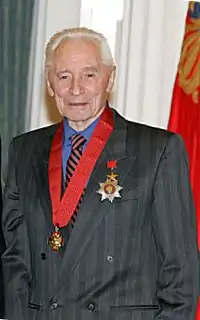Yury Grigorovich
Yury Nikolayevich Grigorovich (Russian: Ю́рий Никола́евич Григоро́вич; born 2 January 1927 in Leningrad) is a Soviet and Russian dancer and choreographer[1] who dominated the Russian ballet for 30 years.


Grigorovich was born into a family connected with the Imperial Russian Ballet. He graduated from the Leningrad Choreographic School in 1946 and danced as a soloist of the Kirov Ballet until 1962. His staging of Sergey Prokofiev's The Stone Flower (1957) and of The Legend of Love (1961) brought him acclaim as a choreographer. In 1964 he moved to the Bolshoi Theatre, where he would work as an artistic director until 1995. His most famous productions at the Bolshoi were The Nutcracker (1966), Spartacus (1967), and Ivan the Terrible (1975). He controversially reworked Swan Lake to produce a happy end for the story in 1984. In 1995, he was accused of having allowed the theatre to plunge into stagnation and after many a squabble was ousted from office. Thereupon he choreographed for various Russian companies before settling in Krasnodar, where he set up his own company. Grigorovich has been heading the juries of numerous international competitions in classical ballet. After the death of his wife, the great ballerina Natalia Bessmertnova, on 19 February 2008, he was offered the opportunity to return to the Bolshoi again in the capacity of ballet master and choreographer.
Honours and awards
- 1957 - Honoured Artist of the RSFSR
- 1957 - Medal "In Commemoration of the 250th Anniversary of Leningrad"
- 1959 - Order nip
- 1966 - People's Artist of the RSFSR
- 1969 - Award of Sergei Diaghilev of the Paris Academy of Dance
- 1970 - Jubilee medal "For Valiant Labour. To commemorate the 100th anniversary of the birth of Vladimir Ilyich Lenin"
- 1970 - Lenin Prize
- 1973 - People's Artist of the USSR
- 1976 - Order of Lenin
- 1977 - Order of Saints Cyril and Methodius, 1st class (Bulgaria)
- 1977 - USSR State Prize
- 1977 - Medal "100 years of Bulgaria's Liberation from Ottoman slavery"
- 1980 - Honorary Citizen of Varna
- 1981 - Order of the October Revolution
- 1981 - People's Artist of the Uzbek SSR
- 1983 - State Prize of the Uzbek SSR
- 1985 - USSR State Prize - for the creation of artistic and athletic programs of the XII World Youth and Student Festival in Luzhniki, Moscow
- 1986 - Hero of Socialist Labour
- 1986 - Order of Lenin
- 1987 - Order of the People's Republic of Bulgaria, 1st class
- 1995 - Honoured Artist of Kazakhstan
- 1996 - People's Artist of the Republic of Bashkortostan
- 1997 - Vaslav Nijinsky Medal (Ministry of Culture of Poland)
- 2001 - Order of the Arts' Amber Cross ", the highest award of the Russian Academy of Arts and musical performance
- 2002 - Order of Merit for the Fatherland, 3rd class - for outstanding contribution to the development of choreographic art
- 2002 - "Badge poshani" (Honor), the highest award of the mayor of Kyiv
- 2002 - Badge of "370 years of Yakutia in Russia"
- 2002 - Fyodor Volkov award for his contribution to the theatrical art of the Russian Federation
- 2003 - National Theatre Prize Golden Mask in nomination "For the honour and dignity"
- 2003 - Badge of "civic virtue" of the Republic of Sakha (Yakutia)
- 2003 - Medal of the "Hero of Labour of Kuban" (Krasnodar region)
- 2004 - Order of Merit (Ukraine), third class
- 2004 - Medal of the National Opera of Ukraine to the 100th anniversary of Serge Lifar
- 2004 - Badge of Honor of the Ministry of Culture and the Arts "for his personal contribution to the development of art"
- 2005 - The highest theatrical award of St. Petersburg "Gold soffit"
- 2005 - Order of Dostyk
- 2006 - Award "Russian National Olympus" in nomination "Man epoch", medal "For the honor and valor"
- 2006 - Ludvig Nobel Prize
- 2007 - Order of Merit for the Fatherland, 2nd class - for outstanding contribution to the development of domestic and international choreographic art, many years of creative activity
- 2007 - Order of Francisc Skorina
- 2008 - Ovation
- 2009 - Medal of Honour (Armenia)
- 2011 - Order of Merit for the Fatherland, 1st class
References
- todayszaman.com Archived October 5, 2012, at the Wayback Machine